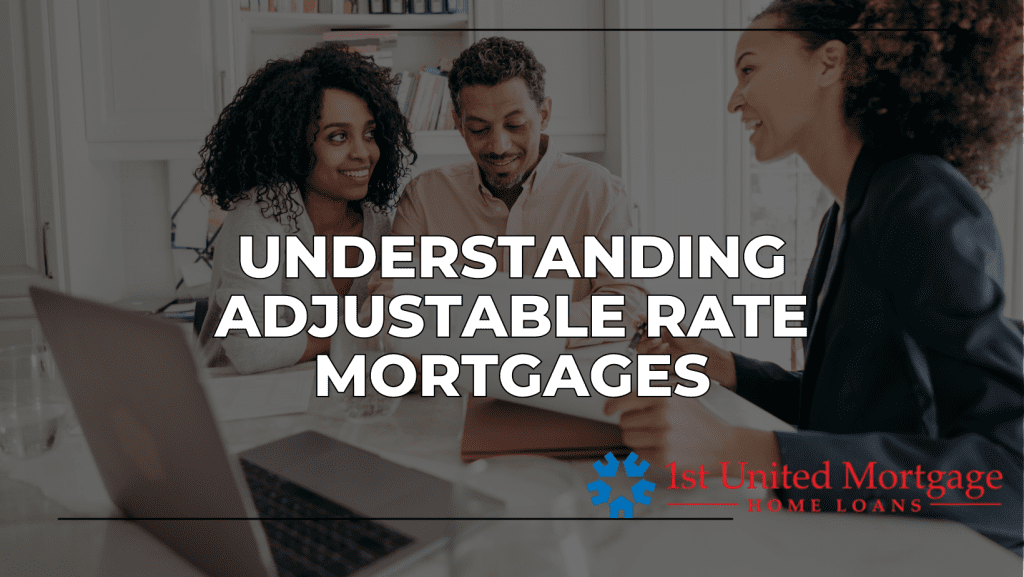
In the realm of mortgage options, adjustable-rate mortgages (ARMs) present an alternative to traditional fixed-rate mortgages. At 1st United Mortgage, we recognize the importance of understanding the nuances of ARMs to help our clients make informed decisions regarding their home financing. In this comprehensive guide, we’ll explore the mechanics of ARMs, delve into their pros and cons, and provide insights to aid you in determining whether an ARM aligns with your financial goals and circumstances.
Deciphering Adjustable-Rate Mortgages
An adjustable-rate mortgage operates on a variable interest rate structure, distinguishing it from its fixed-rate counterpart. Unlike fixed-rate mortgages, where the interest rate remains constant throughout the loan term, ARMs feature fluctuating rates that adjust periodically based on predetermined terms. The most common variant is the hybrid ARM, offering an initial fixed-rate period followed by adjustable rates dictated by market indexes such as the Secured Overnight Financing Rate (SOFR). Understanding the components of ARMs, including caps on rate adjustments, is essential for borrowers navigating these dynamic mortgage products.
Pros of Adjustable-Rate Mortgages
ARMs present several advantages that may appeal to certain borrowers:
- Low Initial Fixed Rate: The initial fixed-rate period of ARMs often boasts lower interest rates compared to fixed-rate mortgages, providing cost savings, particularly for short-term homeownership plans.
- Lower Payments: With lower initial interest rates, ARMs offer reduced monthly payments, affording borrowers flexibility to allocate funds towards other financial priorities.
- Rate Caps: ARMs incorporate rate caps, limiting the extent to which interest rates can increase during adjustment periods, and shielding borrowers from drastic payment hikes.
Cons of Adjustable-Rate Mortgages
Despite their appeal, ARMs come with inherent drawbacks that warrant consideration:
- Interest Rate Volatility: ARMs are susceptible to interest rate fluctuations, resulting in potential increases in monthly payments, which may strain borrower finances, particularly in rising-rate environments.
- Limited Availability: Not all lenders offer ARMs, and borrowers may encounter challenges in finding suitable terms that align with their preferences and financial objectives.
- Budgeting Challenges: The variable nature of ARMs complicates budgeting efforts, as changes in monthly payments can be unpredictable, posing challenges for individuals with fixed budgets or unstable income streams.
Determining Suitability
Whether an ARM is the right choice depends on individual circumstances and preferences. Consider the following factors to assess suitability:
- Financial Flexibility: Borrowers seeking short-term homeownership or anticipating refinancing before the fixed-rate period ends may benefit from the lower initial rates offered by ARMs.
- Payment Affordability: Those comfortable with potential fluctuations in monthly payments and equipped to absorb increased costs may find ARMs suitable, provided they can withstand rate adjustments.
- Long-Term Plans: Borrowers planning extended stays in their homes or prioritizing stability in mortgage payments may favor fixed-rate mortgages over ARMs to mitigate uncertainty.
Navigating the intricacies of adjustable-rate mortgages requires careful consideration of their pros and cons concerning individual financial circumstances and objectives. At 1st United Mortgage, we’re committed to providing personalized guidance and expertise to empower our clients to make informed decisions about their home financing options. Whether you’re intrigued by the flexibility of ARMs or prefer the stability of fixed-rate mortgages, our team is here to assist you every step of the way.
Ready to explore your mortgage options? Contact us today at (931) 548-1985 or visit our website to connect with one of our knowledgeable mortgage specialists. Let us help you navigate the complexities of home financing with confidence and clarity.
